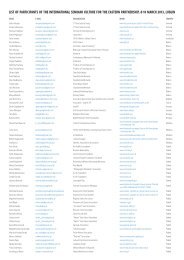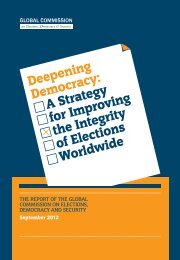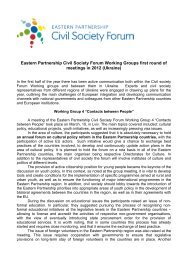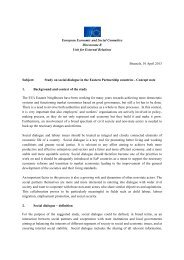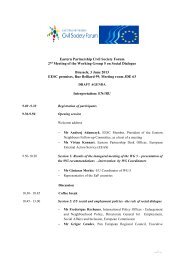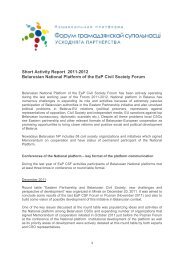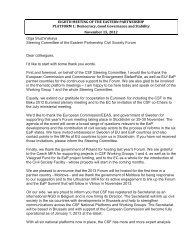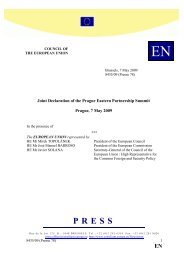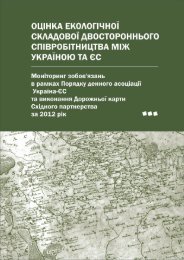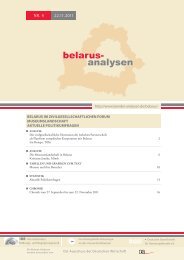Non-formal education - Eastern Partnership Civil Society Forum
Non-formal education - Eastern Partnership Civil Society Forum
Non-formal education - Eastern Partnership Civil Society Forum
Create successful ePaper yourself
Turn your PDF publications into a flip-book with our unique Google optimized e-Paper software.
Moldova<br />
– Draft Strategy of sectorial development “Education 2020”.<br />
– National Development Strategy for 2008-2011 in the list of measures 4.3.1. to create an<br />
educated workforce to keep competitive throughout the active life in paragraph (v) recommended<br />
“authorization and monitoring of <strong>education</strong>al services and the assessment of competence<br />
centers in non-<strong>formal</strong> <strong>education</strong> (including adults).”<br />
– Law on Education, 1995, 34-35<br />
– The concept of the development of <strong>education</strong> in the Republic of Moldova<br />
– The concept of non-<strong>formal</strong> <strong>education</strong>, 2003<br />
– National Strategy and Action Plan ‘Education for All’, 2004<br />
– Memorandum of the Commission of European Council on lifelong learning, 2000<br />
b) Social organizations (civic <strong>education</strong>, human rights, etc.)<br />
– Law on the rights of children № .338-XIII, 1994.<br />
– Law on Youth # 279-XIV, 1999<br />
– National Strategy on Youth for 2009-2013, approved by Law # 25 from 03.02.2009<br />
– Strategy for the Development of <strong>Civil</strong> <strong>Society</strong> 2012-2015, adopted by the Parliament of the<br />
Republic of Moldova, September 27, 2012<br />
– National Strategy of the Republic of Moldova 2012-2020<br />
Ukraine<br />
– Law On Education (1991)<br />
– State program “Education” (Ukraine XXI Century) (1993)<br />
– Declaration on the Basic Principles of Youth Policy (1993)<br />
– The concept of distance <strong>education</strong> (2000)<br />
– “National doctrine of <strong>education</strong>” (2002),<br />
– Conceptual principles of adult <strong>education</strong> (Institute of pedagogical <strong>education</strong> and adult <strong>education</strong><br />
APSU, 2009)<br />
Financing<br />
In the funding of NFE three sources can be considered:<br />
1) International donors who give money to projects implemented by NGOs in various fields, including<br />
civic <strong>education</strong> and the formation of democratic values.<br />
2) Business structures oriented to fast results and profits, which is why large corporations set up<br />
their own training centers to train their employees in high-tech, knowledge of foreign languages or of<br />
specialized courses. So, the business has no interest in non-profit projects and initiatives.<br />
3) The public sector is focused mainly on <strong>formal</strong> <strong>education</strong>, or what is called retraining. Regarding<br />
other areas of <strong>education</strong>, the state is actively using resources to foreign investment for projects in the<br />
vocational sector, as it is a priority, given the weak economic and socio-political situation in the region.<br />
Successful practices<br />
However, in each of the countries – participants of the <strong>Eastern</strong> <strong>Partnership</strong> – can certainly be found<br />
examples of effective action in the field of NFE.<br />
For example, in Belarus, an important project «TOLLAS – Towards Active society at any age was<br />
implementedwith the support of dvv international.<br />
The project “Reform strategy in the field of vocational <strong>education</strong> and training and pilot implementation<br />
in the selected region in Azerbaijan” funded by the European Union and implemented by the British<br />
Council (UK), PEM GmbH (Germany) and the Technical College of Aarhus (Denmark) and has been<br />
successfully implemented in Azerbaijan.<br />
9



